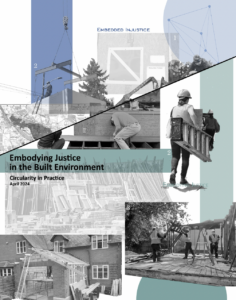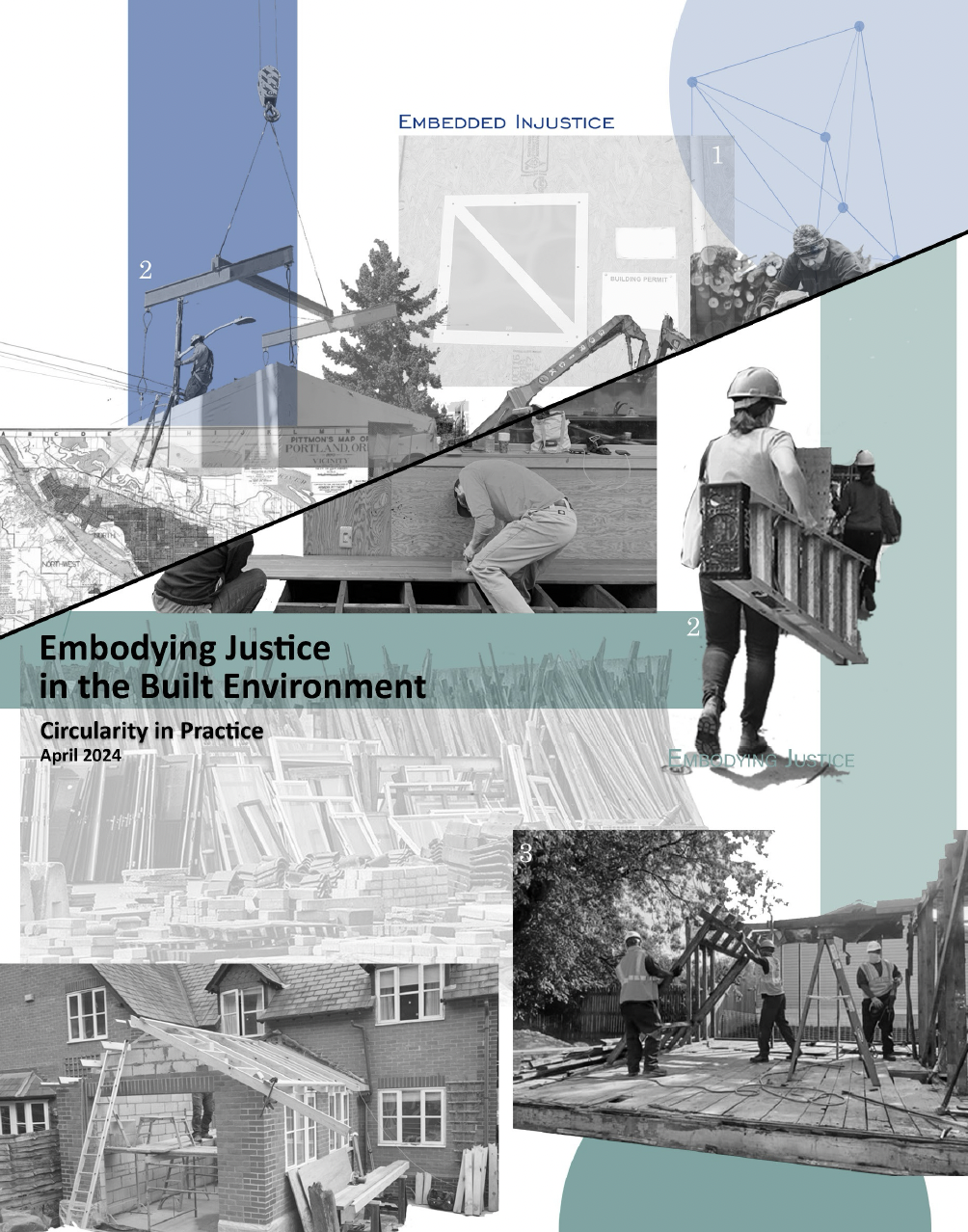For Immediate Release
April 15, 2024
NEW RESOURCE: Embodying Justice in the Built Environment: Circularity in Practice
A New Guide and Workbook for Applying Justice Principles to Materials Resource Management, New Construction, and Alternatives to Demolition
Embodying Justice in the Built Environment: Circularity In Practice explores justice principles and provides a framework for centering justice in embodied carbon policies and planning. Exploratory questions, designed as a workbook, guide the user through a process which centers meaningful community engagement in considering social, economic, and labor impacts and opportunities rooted in an understanding of the local historical context. Practical examples of strategies which embody justice provide insights and inspiration.
The workbook was created by researchers in the Just Places Lab, Reparative Praxis Lab, and Circular Construction Lab at Cornell University in partnership with the Susan Christopherson Center for Community Planning and the Circularity, Reuse, and the Zero Waste Development (CR0WD) Network. CNCA members provided input and feedback during development of the workbook.
The design and function of our carbon-intensive built environment have been shaped by systems of social, economic, and political injustice. These injustices are evident in the disproportionate lack of access to safe, healthy, and affordable housing, displacement of long-term residents and businesses, lack of proximity to services and good schools, and exposure to toxins as well as in the human rights and labor abuses in the production of raw materials.
“Injustice is as embodied in our built environment as carbon is,” said Tracy Morgenstern, CNCA’s Director of Climate Justice. “Decarbonizing the building sector therefore requires a systems-based circular approach rooted in justice principles. This workbook provides a practical and comprehensive guide for cities, communities, advocates, and industry to begin this work.”
“When policy makers lack a system to consider the implications of policies in their jurisdiction and greater region, they risk deprioritizing and harming both local frontline communities from development activities and distant communities who may be affected by pollution from resource extraction, manufacturing, and transportation of building materials. This workbook offers thoughtful solutions to mitigate climate change and tools to improve the quality of policy analysis with the goal of not only avoiding future injustices in the built environment, but building equity for previously marginalized communities in the planning and policy making process. It should be indispensable to any jurisdiction or community organization developing climate action plans”. – Lauren Zimmermann, Portland Bureau of Planning and Sustainability
Simone Mangili, CNCA’s Executive Director, emphasizes that as cities begin to consolidate pathways to reign in emissions generated across the whole life cycle of materials and buildings it is critical that the lived-experience and well-being of communities is centered along every step of the value chain to ensure that the principles of reparative and restorative justice are embedded in climate planning and policy. CNCA is deeply committed to helping cities put theory into practice while charting new approaches in the just transition.
“It’s important that we engage in holistic and sustainable efforts to reduce carbon and work towards carbon neutral futures. We can’t do that unless we center justice and equity in these efforts. This workbook offers a guide to center justice and equity as practitioners and policymakers implement strategies in waste and circularity.” – Dr. Jocelyn Poe, Cornell University Reparative Praxis Lab.
CNCA continues to partner with field leaders to develop resources for reducing embodied carbon in the built environment. This most recent release, providing a practical approach for centering justice, builds on the City Policy Framework for Dramatically Reducing Embodied Carbon and CR0WD’s A Local Government Policy Guide to Alternatives to Demolition through Deconstruction and Building Material Reuse.
The project team will host a webinar on May 22nd at 9:00 Pacific/12:00 Eastern. Register here for the webinar.
Learn more about CNCA’s Climate Justice and Built Environment programs, Cornell’s Just Places Lab, Reparative Praxis Lab and Circular Construction Lab, and CR0WD.
 |
Available for Download: Embodying Justice in the Built Environment: Circularity in Practice_ In Partnership With:  |
About Carbon Neutral Cities Alliance:
The Carbon Neutral Cities Alliance is a collaboration of leading global cities achieving carbon neutrality in the next 10-20 years — the most aggressive GHG reduction targets undertaken anywhere by any city. While it is possible for cities to achieve their interim carbon reduction targets through incremental improvements to existing systems, achieving carbon neutrality requires radical, transformative changes to core city systems. CNCA’s mission is to mobilize transformative climate action in cities in order to achieve prosperity, social equity, resilience and better quality of life for all on a thriving planet.
Media Contact:
Michael Shank, CNCA Director of Engagement
michaelshank@carbonneutralcities.org
Program Contact:
Tracy Morgenstern, CNCA Director of Climate Justice
tracymorgenstern@carbonneutralcities.org
###


